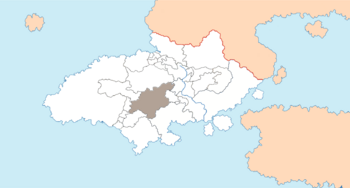Gmunenhochwald: Difference between revisions
No edit summary |
No edit summary |
||
| Line 125: | Line 125: | ||
|footnotes = <!--For any generic non-numbered footnotes--> | |footnotes = <!--For any generic non-numbered footnotes--> | ||
}} | }} | ||
Gmunenhochwald, officially the '''Raugraviate of Gmunenhochwald''', is a semi-independent constituent state of [[Dolchland]]. It is located It borders the states of [[Panedonia]] to the south and east, [[Archduchy of Greater Vethringen|Greater Vethringen]] to the north, [[Macklenover]], [[ | Gmunenhochwald, officially the '''Raugraviate of Gmunenhochwald''', is a semi-independent constituent state of [[Dolchland]]. It is located It borders the states of [[Panedonia]] to the south and east, [[Archduchy of Greater Vethringen|Greater Vethringen]] to the north, [[Macklenover]], [[Landgraviate of Märzwald|Märzwald]] to the south-west and [[Landgraviate of Witternen|Witternen]] to the east. It sits astride the heavily forested southern slopes of the $$$ Mountains. Although not a wealthy country, primarily due to the broken and mountainous nature of its terrain, its position means that its territory holds many of the southern passes through the mountains from the lower coastal plains of Dolchland. This has meant that the area has often been fought over, which has meant that the inhabitants are often suspicious of outsiders. In turn, the historical reaction of Gmunenhochwalders to enemy armies, namely retreating to the higher forested peaks and then ambushing them in the passes, has meant that the inhabitants are often regarded as sneaky and unstrustworthy by their neighbours. | ||
Due to the nature of the Raugraviate as more of a collection of high valleys, isolated pastures, isolated settlements and castles looming over precarious roads, the Raugraves have often been forced into a more consensual style of rule, rather than authoritarian or absolutist. This means that whilst the people of the state are often much more independently minded than their neighbours, they feel that they have much more at stake in their state than many of the others. | Due to the nature of the Raugraviate as more of a collection of high valleys, isolated pastures, isolated settlements and castles looming over precarious roads, the Raugraves have often been forced into a more consensual style of rule, rather than authoritarian or absolutist. This means that whilst the people of the state are often much more independently minded than their neighbours, they feel that they have much more at stake in their state than many of the others. | ||
The state was historically famous for its knightly highwaymen, termed | The state was historically famous for its knightly highwaymen, termed ''Raubritter'', and the ''Grenzjäger'', the gendarmerie that descend from the bands of irregulars that harried invaders of Gmunenhochwald. | ||
[[Category:Dolchland]] | [[Category:Dolchland]] | ||
Revision as of 17:59, 17 November 2021
Raugraviate of Gmunenhochwald Raugrafschaft auf Gmunenhochwald (Alemannisch) | |
|---|---|
|
Flag | |
 | |
| Location | Gmunenhochwald within Dolchland. |
| Capital | Gmunendorf |
| Official languages | Alemannisch |
| Government | |
• Raugrave | Ernst Klemens VI |
| Hirtenrat | |
| Constituent State of Dolchland | |
Gmunenhochwald, officially the Raugraviate of Gmunenhochwald, is a semi-independent constituent state of Dolchland. It is located It borders the states of Panedonia to the south and east, Greater Vethringen to the north, Macklenover, Märzwald to the south-west and Witternen to the east. It sits astride the heavily forested southern slopes of the $$$ Mountains. Although not a wealthy country, primarily due to the broken and mountainous nature of its terrain, its position means that its territory holds many of the southern passes through the mountains from the lower coastal plains of Dolchland. This has meant that the area has often been fought over, which has meant that the inhabitants are often suspicious of outsiders. In turn, the historical reaction of Gmunenhochwalders to enemy armies, namely retreating to the higher forested peaks and then ambushing them in the passes, has meant that the inhabitants are often regarded as sneaky and unstrustworthy by their neighbours.
Due to the nature of the Raugraviate as more of a collection of high valleys, isolated pastures, isolated settlements and castles looming over precarious roads, the Raugraves have often been forced into a more consensual style of rule, rather than authoritarian or absolutist. This means that whilst the people of the state are often much more independently minded than their neighbours, they feel that they have much more at stake in their state than many of the others.
The state was historically famous for its knightly highwaymen, termed Raubritter, and the Grenzjäger, the gendarmerie that descend from the bands of irregulars that harried invaders of Gmunenhochwald.
